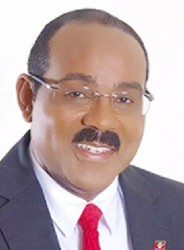Caricom’s Chairman, Antigua and Barbuda’s Prime Minister Gaston Browne said that given President Donald Ramotar’s assurances that he will make an announcement on General Elections early in 2015 the community is “not too concerned at this point” over the prorogation of the Guyanese Parliament.
He told Stabroek News during a phone interview yesterday from his office in Antigua and Barbuda, that Caricom will “respect the President’s judgment and Constitutional right,” to suspend the legislative branch of government. He said that at this point the community will be keenly watching the development of the situation and how it plays out in the coming months and should Ramotar renege on his commitment to name a date for General Elections, Caricom is committed to engaging as mediators.
Browne stated that the current political crisis in Guyana was raised by Ramotar himself on Monday at a meeting of the Heads of Government during the Fifth Caricom-Cuba Summit held in Havana.
Stabroek News asked the Chairman how such a decision by the President though constitutionally permissible was acceptable as it had resulted in a suspension of the National Assembly for a month now preventing the body of elected officials from meeting and conducting work on behalf of the people. Browne said that Caricom was not looking to aggravate any of the parties involved including government and that Guyana’s parliamentary prorogation was a domestic issue.
He said that Caricom was sufficiently satisfied that the President’s decision was not intended as an abuse of power and that given Ramotar’s assurances that he will call general elections in 2015 the President’s decisions had to be respected.

Caricom’s Chairman spoke about the long history of democracy in the region and that as a regional body Caricom was committed to “respect the democratic traditions of the Caribbean.”
He said that that while Ramotar spoke in Havana, the community was duly satisfied that the creation of an autocratic state was not the intention behind the prorogation.
Observers note that Ramotar’s decision to hold a press briefing at State House on Saturday and stating that he would make an announcement in early 2015 on general elections was a pre-emptive move by the administration to defuse any questioning by leaders at the Caricom summit.
Browne remained optimistic and refrained from speaking on how Caricom would proceed should the regional body not be impressed with Ramotar’s future handling in of the Parliamentary prorogation. He also declined to elaborate on correspondence with the government or members of the opposition.
Both opposition groups, A Partnership for National Unity and the Alliance For Change (AFC) had written to Caricom to express concerns and as part of their joint decision to internationalise the issue.
Leader of the Opposition David Granger has urged that an emergency meeting of Heads of Government of Caricom be convened “to consider a collective approach to the governance crisis in Guyana.” Caricom Secretary General Irwin La Rocque told Stabroek News on November 29, that he had received a letter from Granger and AFC leader Khemraj Ramjattan requesting that he bring certain matters to the attention of the Caricom Heads of Government. Asked whether the matter would likely be discussed at the next summit of Caricom Heads of Government, La Rocque said that he did not know as there is no agenda yet.
Meanwhile, as it stands the stalemate between the opposition and government remains. Granger formally declined to speak with Ramotar via a letter on Monday. In the letter Granger reiterated the opposition’s stance that there will be no discussions until the prorogation has ended.
Ramotar has held fast to the constitutional propriety of his decision noting that prorogation was the only way to stave off the no-confidence motion by the AFC and continue with the parliamentary agenda. He had stated that during the prorogation, discussions between government and the opposition could occur.
The opposition responded by stating that suspending one of the branches of government then requesting talks was a form of dictatorship.




